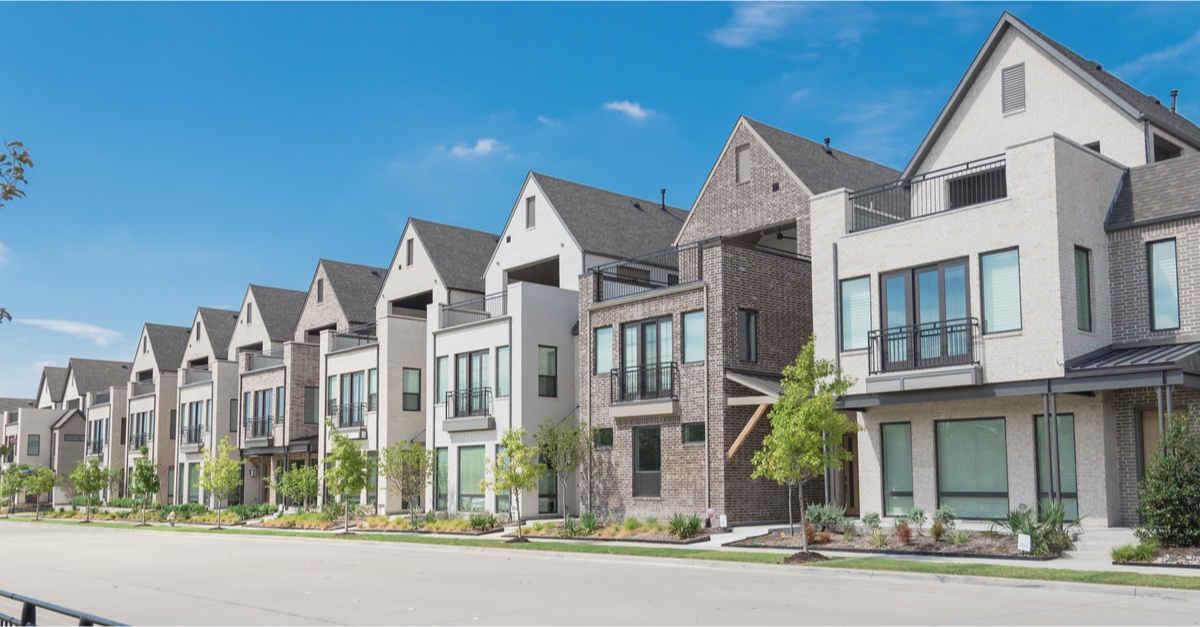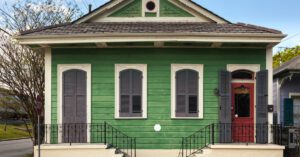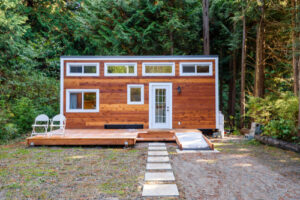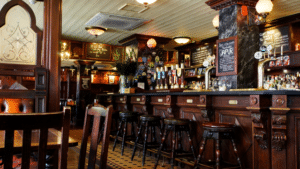With the Guelph real estate market booming, many buyers are now considering a townhouse. In this blog, we’ll look at the pros and cons of buying a townhouse. We’ll also look at the differences between a freehold and condo townhouse so you can choose the best option for you.
Jump to specific sections:
What is a townhouse?
Also known as a town house, a freehold townhouse or townhouse condo, they’re mostly the same thing.
In the simplest terms: Townhouses are a style of multi-level home that share one wall (an end unit) to two walls (neighbours on either side) with adjacent properties. Unlike apartments or condo towers, townhouses all have their own entrances that are not shared with other owners.
What do townhouses look like?
In Guelph, townhouses are often in a distinct community or area. They are typically found in newer developed urban areas and generally have a uniform look. Older townhouses tend to be more traditional rowhomes like you could imagine seeing in England (a good example of this in Guelph are the rowhomes at 90- 100 Neeve St).
Expect to pay the same costs in a townhouse as most homes:
- Home insurance
- Property taxes
- Maintenance fees (for condo townhouses, see below)
- Utilities
General tips when considering a townhouse:
Listen closely when considering a townhouse: Shared walls mean it might be possible to hear what’s happening in your neighbour’s house. And, of course they may be able to hear you.
When you’re checking out townhouses, listen carefully to see how much sound travels from next door. This is why end units typically sell for a small premium because you’ll only have to worry about half the noise.
The other thing about townhouses is that because you’re often sharing a wall on either side of you, you don’t have side windows. If you enjoy bright direct sun (either morning or afternoon), be sure to buy a unit with east/west exposure from the front or back. Again, this is why end units have a premium: they likely have side windows.
Talk to neighbours if you can
And since you’re going to be close with a neighbour, it’s always a good idea to talk to potential neighbors when you’re considering buying a home. Ask them what they like about the area and if there are any issues you should know about. You’d be surprised what they could tell you.
Lastly, most townhouses have some sort of easement that will impact you (read: easement vs right of way). In a townhouse, it’s likely that your backyard must allow access for utility companies. Or, access for adjoining neighbours as a pass through to get to common areas such as a park or parking lot.
Now, let’s take a look at the pros and cons of a freehold townhouse vs condo townhouse.
What is a freehold townhouse?
A freehold townhouse is a townhouse without any monthly fees. This means there are no extra management fees, no common areas, and no condo association fees. Essentially, it’s a detached home but with a shared wall or two! A freehold townhouse is the opposite of a townhouse with condo fees.
Pro’s:
The obvious benefit of a freehold townhouse: you don’t have extra monthly fees to pay outside of your mortgage. When considering a condo for sale in Guelph, you’ll also need to consider the condo fees. (and your bank will also consider these fees when putting together a pre-approval for you).
With a freehold townhouse, you are 100% in control over your home. Condo fees usually mean that the managing condo corporation has a say in common elements like windows, doors and landscaping.
In a freehold townhouse, you can decorate, upgrade and maintain your house according to your budget and lifestyle.
The last major pro: property appreciation of a freehold townhouse is potentially greater than a property with a fee. This is because condo fees are determined by a Condo Board and can sometimes get out of control if mismanaged. As a result of this unknown, freehold townhomes have become more in demand and with more demand brings higher prices.
Cons:
You are more responsible. This means that there is no snow removal company or landscaper! You have the responsibility to maintain things that condo fees usually cover. If you enjoy doing these things, than a freehold townhouse is for you. Want a low maintenance lifestyle? You may find benefit in paying a fee to have this looked after for you.
Your neighbours (that are attached) can do what they want with their homes. This may mean that they can change their garage door colour to lime green. Or put blow up Santas on their roof in the winter and you have little say. Mind you, they need to ensure they’re within municipal by-law approval, but you get our point!
Just as it was a pro to have faster appreciation of townhouses, it’s also a negative. East Guelph has experienced a boom in freehold townhouses. In some areas the average price has increased over 50%!
This significantly outpaces our estimate of the average price of a house in Guelph. If you’re considering buying a freehold townhouse, work with Guelph real estate agents. This will ensure you know the current market activity.
What is a condo townhouse?
Of course, if you had a choice to pay a monthly condo fee or not for a townhouse, most people would choose not to pay the fee. However, there are key reasons why buying a Guelph townhouse with a fee is beneficial to many. An example of a condo townhouse could be the development found at 30 Vaughan or 49 Rhonda
Pro’s:
Significantly cheaper: it’s estimated that a condo townhouse sells for roughly 20% less than a freehold townhome. This is because buyers are taking the pros and cons of condo fees into account (like their lenders) when making a purchase.
Less maintenance and cost: The cost of necessary exterior maintenance of the unit will be covered by the monthly fee. This includes things such as snow removal, lawn care, and the upkeep of common areas.
It also means that the cost to repair common elements like a roof, windows, doors, stairs and covered for you. Part of your condo fee goes towards a Reserve Fund to pay for major repairs over time. To be sure, carefully review a status certificate for the property in advance of purchase. This will tell you what you are contributing towards with your monthly fees.
The benefit of amenities: As mentioned above, part of your fees go towards major repairs. The other part of the monthly maintenance fees are used towards the preservation of shared amenities. This could include pools, gyms, entertainment rooms, parks and sports courts.
However, if you don’t swim you may not want to contribute to a condo fee to cover pool expenses. The same goes with common party rooms. If you travel a lot, paying for a common space to entertain may not be something you find beneficial.
Cons:
Special assessments: “Special assessment” is not a term you want to hear. This generally happens when a condo board is not saving enough money in the Reserve Fund for expenses. A Condo Corp may require a special assessment to catch up, or get a loan to make repairs.
They may charge this on top of regular monthly fees without getting permission from condo owners. Special assessments are usually due to unforeseen expenses, under-budgeting, or losing a lawsuit. This is why it’s crucial to review a Status Certificate carefully.
You’ll need to work with Guelph Realtors who knows the developments in town.
Example of special assessment
A recent development on Woodlawn Road in Guelph requiring existing owners to pay over $40,000 PER OWNER to cover the cost of window replacement. Many homeowners couldn’t afford the assessment and had to move. However, resale value of condos that have a special assessment is significantly lower as a new owner would take on the cost.
Read the rules: Condo corporations have rules. They can be around pet restrictions to parking to door colours. Make sure you’re comfortable and understand these rules- because Condo Corps often strictly enforce them. This isn’t all negative though.
Some people want more restrictions and a more uniform look throughout the community.
Higher maintenance fees: As previously mentioned, condo townhouses require you to pay a monthly maintenance fee. This is to care for the amenities outside of your unit. These fees are based on funds for the Reserve Fund for major repairs and funds for day to day maintenance.
The latter can cost the condo corporation more if the costs get more expensive. An example: a nursery charging more for flowers, so they pass this cost onto the landscaper for your condo. Then, the landscaper charges more to maintain your property.
Planning on being in this property for a short time? You’ll be contributing for major expenses like roofs and doors that you’ll never benefit from.
What is a stacked townhouse?
A stacked townhouse is two or more individual townhouses that are stacked on top of each other and are owned individually. This is often where the first townhouse in the stack has the main and lower level. The second townhouse unit utilizes the second and third floor.
Each owner owns individually and has private and secure access directly into the home. A good example of this is the Stewart Mill towns on Cardigan St in Guelph or the ones located on Law Drive.
Buying a townhouse takes a lot of consideration. Do you want a property that offers amenities? Do you want to share walls with a neighbour?
As you make this decision between a freehold townhouse or condo townhouse, remember to take into consideration both your short and long term needs.
Have questions?
If you’re considering homes for sale in Guelph, get in touch with our team. We’d be happy to give you an idea of the different options within neighbourhoods around Guelph!



